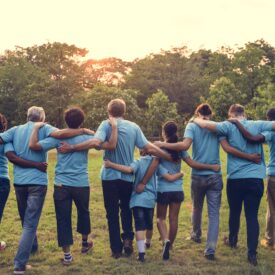One in four women will experience domestic abuse and one in five will experience sexual assault during her lifetime, according to a 2019 report by the Home Office. [1] These statistics, along with a series of high-profile attacks against women, have placed domestic abuse and violence against women and girls (VAWG) towards the top of the UK Government’s priority list.
The Domestic Abuse Bill (2021) changed the legal definition of abuse to include emotional, coercive and controlling behaviour and economic abuse alongside physical abuse. [2] This broader legal definition of abuse means housing assistance is available for all eligible survivors of domestic abuse. In this article, Louisa Steele, the Housing First and Homelessness Project Manager at Standing Together Against Domestic Abuse, discusses the Westminster VAWG Housing First project and how partnership working enhances the Housing First Service provided.

Contrary to past assumptions, evidence clearly indicates that women do experience long-term homelessness, and that women and men experience this form of homelessness differently. Tragically, women almost universally experience domestic abuse and wider forms of VAWG alongside homelessness, and our service response must reflect this. At the Westminster VAWG Housing First project, this is something that we know well. Every woman accessing our service has experienced long-term or repeated homelessness, the high needs associated with this form of homelessness, experiences of multiple disadvantages, and violence and abuse. One of the women that we support tells us what this was like for her:
“I was just interested in keeping safe, and finding somewhere to lay my head, and because I was dependent on people giving me a place to stay, I put up with a lot of negative behaviour and abuse as I had no choice or options.”
Housing First Client, Naima
It’s becoming more widely recognised that service models like Housing First, which were originally developed to meet the needs of men, must be adapted to properly recognise, respect and respond to women like Naima’s needs. The Westminster VAWG Housing First project is one of the first Housing First projects in England modified for women, where the support is delivered by specialist women’s sector providers, in this case London based organisation Solace Women’s Aid. The service is commissioned by Westminster Council and dedicated housing coordination support is provided by Standing Together Against Domestic Abuse (STADA), who manage partnerships with our housing providers (Peabody, Southern Housing Group, L&Q, Women’s Pioneer Housing, Octavia Housing and The Guinness Partnership) and evaluate the project outcomes. Opening its doors in autumn 2019 to ten women, the service is now in its third year and has the capacity to support thirty women.
Experiencing violence and abuse from someone you love and are supposed to be able to trust is a gendered experience. Trauma from an experience like this accumulates with time and is often compounded by further abuse and negative interactions with agencies. By the time women are referred to our Housing First service their needs are high and complex, and they often find it difficult to engage with and trust a new service.
“They will go out of their way to try and work with somebody. So I mean, the only thing I would be able to say is that I’ve been through the situation with these, and you can trust them 110%”
Housing First Client Michelle
We have responded by prioritising pre-engagement work, working with homelessness outreach teams to meet with women, and essentially giving women as much time as they need before nominating them for housing. This allows us to build those crucial relationships and find out what a woman wants and needs to feel safe in a tenancy.
Once women feel ready to be nominated for housing, Standing Together works closely with them and partner housing providers to find the right property for them. Critically, women have a choice in the type of position and location of the property and can turn properties down until they find one that is right for them. Physical and emotional safety in a property is only one part of the puzzle, but it is a crucial one. The effectiveness of this approach is reflected in our tenancy sustainment rate, which in year 2 was 90%.
Supporting women to build emotional safety and resilience is another key function of the service. Many women remain in relationships with their abusers, meaning that they are constantly at high risk of serious harm or death. They are often also at high risk of experiencing violence from others.
“The benefits have been in regards to being safe, getting off the street and understanding DV better and how it impacts you, as discussions that I have had, has helped me to realise that I pick unhealthy relationships and I have low confidence which I can begin to work on, as previously I was not a priority as I did not have the space or chance to work on me, or reflect on my life the way I can do now.”
Housing First Client – Bev
The Housing First support team at Solace Women’s Aid are domestic abuse/VAWG specialists and therefore have the knowledge and skills to have conversations with women about their safety and their relationships. This is nuanced and open-ended work, and essential in supporting women to have a greater understanding of their situations and give them choice about what they want to do.
Our yearly evaluations have evidence that our model is an effective approach to responding to the unique needs of women accessing our project, however, there are specific areas we want to work on going forward. We recognise that the majority of women being referred into the service are white and British, and we need to do more to reach black and minoritized women and think about how their needs and experiences will be different, and where we need to adapt support. We also need to think about how we can build better partnerships with local agencies which challenge the stigma and judgement held against this group of women, enabling more positive interactions with all services and support.
I want to finish with a call for action, for all Housing First providers, not just those providing dedicated services for women, to reach out to and work with your local specialist women’s service providers. Although you may work in different ways, together you can ensure that women get the tailored support that they need. Take stock of how the needs of your female clients are different to men, and how even small adjustments/changes to your service can have a big impact.
[1] Home Office (2019), Violence against Women and Girls and Male Position Factsheets
[2]Home Office and Ministry of Justice(2021), Domestic Abuse Bill
Register FREE to access 2 more articles
We hope you’ve enjoyed your first article on GE Insights. To access 2 more articles for free, register now to join the Government Events community.
(Use discount code CPWR50)




